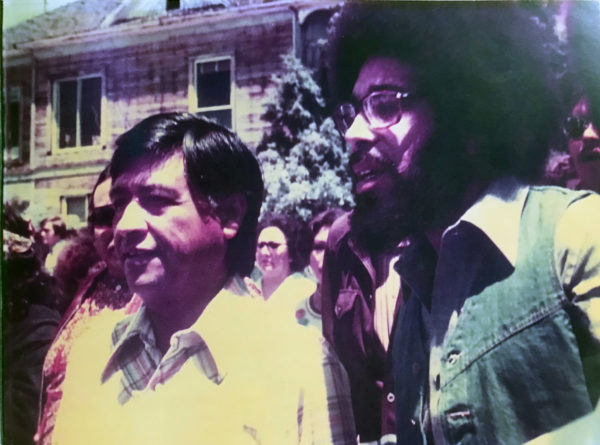Co-founder of the United Farm Workers inspired San Diego organizers to start UDW

Every March 31 since 2001, California celebrates Cesar Chavez day. The holiday, which falls on the legendary labor leaders’s birthday, honors the work Chavez did to organize farm workers and promote civil rights for all.
You may know Chavez as the co-founder, along with Dolores Huerta, of the United Farm Workers (UFW) union. But did you know he was also largely responsible for founding UDW? It’s true! And the story of our founding shows how the shared experiences of different groups of workers can help build power.
In the 1960s and 70s, many spouses of farm workers were domestic workers. Chavez saw that the two groups of workers had much in common, including being specifically excluded from the National Labor Relations Act of 1935 due to the racism of Southern politicians. Chavez had long believed that domestic workers, like farm workers, needed to be organized into a union to fight for their rights. But most experienced union organizers were hesitant to try organizing a workforce hidden in people’s homes.

“Cesar and Helen Chavez knew all about domestic workers and they’d been trying since 1962 to get someone to organize a union for domestic workers.” says Ken Seaton-Msemaji, who, along with his late wife, Fahari Jeffers and co-founders Greg Akili and Raquel Beltran, started UDW. “Everybody that he approached respectfully turned him down because they thought it was impossible.”
For years, it seemed like Chavez would never find the right people to create the union that would become UDW. But, if the problem was the pessimism of experienced labor organizers, the solution turned out to be finding organizers who had no experience with labor and were unafraid to charge full steam ahead into a completely new form of union organizing.
That’s where Fahari and Ken came in. In the early 70s, Fahari and Ken were a young couple deeply involved in social justice and civil rights. They were already well-known to Chavez from their work with NIA Cultural Organization and other community-based initiatives.

“One of his people said to him ‘look, remember your domestic worker thing? These people will probably say yes–and they can probably do it,” says Ken of being hand-picked by Chavez to begin the organizing work for our union.
“Everybody thought it was impossible. I knew so little about it. That’s what saved me,” he says.
After forming an organizing committee in 1977, Ken and the others set about doing the work that others were afraid to take on—reaching out to workers like us in the homes we worked in, listening to our concerns, and giving us a voice to advocate for ourselves, our families, and the people we cared for.
“Cesar Chavez convinced me and Fahari and others that the most important thing we could do with our lives was to organize and empower poor people of all colors and women,” Ken said in a 2015 interview, “We committed to him we would spend our lives giving it our best. This is the hardest work that any of us have ever done or could ever do.”
All we have achieved over the years for our union goes back to the work of these fearless organizers. But the work of our founders and that of the thousands of UDW members who have given their time and dedication to build our union may not have happened had it not been for Cesar Chavez’ vision of justice for domestic workers.

When we observe Cesar Chavez Day, we should honor his legacy of labor activism and social justice and remember how he made sure the voices of California farm workers were heard around the world. But we should also celebrate our own union every Cesar Chavez day. By continuing to fight for the dignity of our work we are living the dream Cesar had for us.


